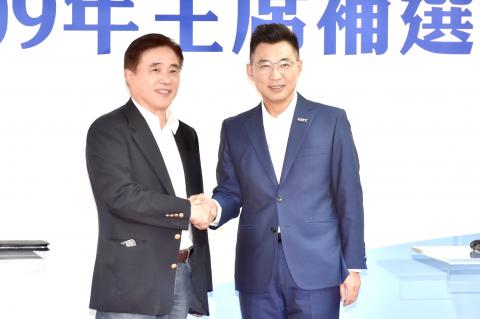The Chinese Nationalist Party (KMT) expects 100,000 fewer voters for its chairmanship by-election on March 7 than in 2017, a party source said.
Today is the deadline for party members to pay their dues, allowing them eligibility to vote in the election, and the source said that the party expects only 310,000 members would be eligible to vote.
About 190,000 eligible voters are exempt from paying party dues, either because they became a senior member after 40 years or are from a middle or low-income household and at least 65 years old, the source said.

Photo: Tu Chien-jung, Taipei Times
That figure excludes more than 10,000 people who became lifetime members after paying a one-time NT$10,000 fee, the source added.
Party members from the KMT’s influential Huang Fu-hsing chapter account for about 80,000 — more than 20 percent — of the eligible voters, the source said.
The chapter is known for its ability to mobilize members during elections, and anticipates a 60 to 70 percent turnout among its members, the source said, adding that this, coupled with concerns that fear over COVID-19 might affect overall turnout, could make the chapter a determining factor in the by-election.
The number of party members who have paid their dues has increased markedly in Changhua and Pingtung counties, as well as in Kaohsiung and New Taipei City, sources said.
In Changhua, about 7,000 members paid their dues, which could have been a result of mobilization by local factions backing the two candidates: former KMT vice chairman Hau Lung-bin (郝龍斌) and KMT Legislator Johnny Chiang (江啟臣), they said.
Another source said that the spike in Changhua members paying dues was not surprising, as it has more KMT executives and members than other regions.
As of yesterday, party dues owed were mostly paid individually or by households of two or three members rather than in a lump sum by dozens of members, the source said.
Even if Chiang’s and Hau’s supporters had mobilized factions to secure voting rights, that would not have been surprising, the source added.
The KMT said that it would start compiling a roster of eligible voters from tomorrow to Wednesday before publishing it for public viewing, and eligible voters would receive a notice informing them of the by-election.
The by-election is to fill the vacancy left by former KMT chairman Wu Den-yih (吳敦義), who stepped down last month after the party’s losses in the Jan. 11 presidential and legislative elections.

A preclearance service to facilitate entry for people traveling to select airports in Japan would be available from Thursday next week to Feb. 25 at Taiwan Taoyuan International Airport, Taoyuan International Airport Corp (TIAC) said on Tuesday. The service was first made available to Taiwanese travelers throughout the winter vacation of 2024 and during the Lunar New Year holiday. In addition to flights to the Japanese cities of Hakodate, Asahikawa, Akita, Sendai, Niigata, Okayama, Takamatsu, Kumamoto and Kagoshima, the service would be available to travelers to Kobe and Oita. The service can be accessed by passengers of 15 flight routes operated by

MORE FALL: An investigation into one of Xi’s key cronies, part of a broader ‘anti-corruption’ drive, indicates that he might have a deep distrust in the military, an expert said China’s latest military purge underscores systemic risks in its shift from collective leadership to sole rule under Chinese President Xi Jinping (習近平), and could disrupt its chain of command and military capabilities, a national security official said yesterday. If decisionmaking within the Chinese Communist Party has become “irrational” under one-man rule, the Taiwan Strait and the regional situation must be approached with extreme caution, given unforeseen risks, they added. The anonymous official made the remarks as China’s Central Military Commission Vice Chairman Zhang Youxia (張又俠) and Joint Staff Department Chief of Staff Liu Zhenli (劉振立) were reportedly being investigated for suspected “serious

ENHANCING EFFICIENCY: The apron can accommodate 16 airplanes overnight at Taoyuan airport while work on the third runway continues, the transport minister said A new temporary overnight parking apron at Taiwan Taoyuan International Airport is to start operating on Friday next week to boost operational efficiency while the third runway is being constructed, the Ministry of Transportation and Communications said yesterday. The apron — one of the crucial projects in the construction of the third runway — can accommodate 16 aircraft overnight at the nation’s largest international airport, Minister of Transportation and Communications Chen Shih-kai (陳世凱) told reporters while inspecting the new facility yesterday morning. Aside from providing the airport operator with greater flexibility in aircraft parking during the third runway construction,

Taiwanese and US defense groups are collaborating to introduce deployable, semi-autonomous manufacturing systems for drones and components in a boost to the nation’s supply chain resilience. Taiwan’s G-Tech Optroelectronics Corp subsidiary GTOC and the US’ Aerkomm Inc on Friday announced an agreement with fellow US-based Firestorm Lab to adopt the latter’s xCell, a technology featuring 3D printers fitted in 6.1m container units. The systems enable aerial platforms and parts to be produced in high volumes from dispersed nodes capable of rapid redeployment, to minimize the risk of enemy strikes and to meet field requirements, they said. Firestorm chief technology officer Ian Muceus said